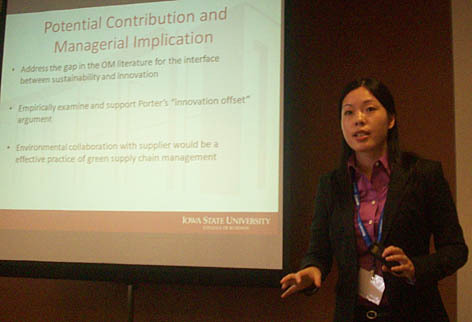
Jing Dai, a College of Business Ph.D. student at Iowa State, presented preliminary findings from her research of 264 publicly-traded U.S. companies on how their green practices impact operational efficiency at the Decision Science Institute annual meeting last fall in Boston. Photo by Qazi Kabir
AMES, Iowa -- Corporate environmental practices can help a company's "green" efforts, but can it also yield more "green" from improved performance? An Iowa State University College of Business Ph.D. student has found that it can, if those firms incorporate their environmental practices with their suppliers.
For her doctoral dissertation, Jing Dai has directed data collection from managers of some 264 publicly-traded companies in the U.S. (82 percent manufacturing companies), including 3M, Apple Computer, Walmart and General Motors, among others. She's already found that proactive environmental management strategies -- including collaborating with suppliers -- have helped benefit their operational performance in terms of greater efficiency.
"We found that you needed to first collaborate with your suppliers," she said. "So you work with your supplier to make sure that they also understand your environmental requirements and try to use this knowledge to improve the green products and green process. And then this collaborative relationship with suppliers can increase environmental innovation, which will have a very important role on improving operational performance."
"The proactive environmental management might not achieve immediate financial benefits because improving environmental performance involves higher costs," said Dai, who majors in business administration. "I collected the data for this study in 2011 and my future research would revisit this study by including those firms' next three or five years financial performance -- e.g., ROA (return on assets), ROS (return on sales) and market shares."
Preliminary results presented
She presented some preliminary results from her study over the past academic year at both the Decision Science Institute annual meeting last fall, and to both Iowa State President Steven Leath and Provost Elizabeth Hoffman during a site visit to the College of Business this spring.
She's found that environmental management can lead to innovation and produce benefits such as resource productivity and more efficient production. Those benefits can offset the perceived higher cost of implementing environmental practices.
"Some of them [corporate officials] think that any environmental expense beyond what it required by government regulation will be negative to the shareholder or the company. So they think those environmental expenses will degrade the company's performance because of perceived high cost of implementing the environmental management," Dai said. "And they also feel uncertainty for the payback. So that makes some companies reluctant to implement the proactive environmental management.
"But environmental management can bring a win-win situation for the companies because they can improve their reputation with both the community and the consumer by becoming a more socially responsive entity," she continued. "And they also probably have the chance to access a new market [within green practices] and have a very good marketing opportunity."
Some green leaders
Some firms have turned their environmental management strategies into greater operational performance. For example, Dai learned that Walmart launched a supplier sustainability index to promote environmental consideration across its supplier network. Amazon also worked with suppliers, such as Philips, to cut out clamshell packaging and stick with boxes that are made from recyclable materials.
"By cutting wasteful packaging, Amazon reduced its carbon footprint and improved delivery performance," she said. "Southwest Airlines is making incremental innovation changes, such as adding lighter-weight carpeting, seat covers, and life vests to become even more fuel-efficient, which translates to lower operational cost."
Dai says corporate environmental practices often find companies trying to become more energy efficient. They also use recycling to conserve their raw materials -- renewable materials that lead to the cost reduction.
"All of these can probably lead to the cost reduction and also reduce the waste in the company, so then it can improve the operational performance -- including the quality, delivery and flexibility to respond to the customer's demand for the green requirements," she said.
Dai is continuing her analysis to complete her dissertation next year. She also hopes to get the complete study published in a professional journal.